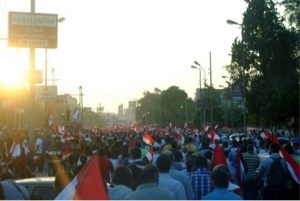A bloody crackdown on pro-Morsi Islamists by Egyptian security forces on August 14 allegedly has served as the trigger for a national wave of violence against Egyptian Coptic Christians.
The Egyptian Coptic Christian minority, representing roughly ten percent of the Egyptian population, has long peacefully coexisted with the majority Sunni Muslims. While violence does periodically erupt between the two factions, particularly in the rural south, the recent attacks on churches and Christian properties are “the worst in years.”
Islamists have destroyed homes, churches, schools, shops, and at least one orphanage. At least three people have died. The military and security forces have stood by and made no attempt to intervene; few Christians anticipated an investigation into the attacks.
The citizen-against-citizen, interfaith violence ultimately stems from the events surrounding the recent election and overthrow of former Egyptian President, Mohammed Morsi. Morsi was the first democratically elected leader of Egypt after the protests in the 2011 Arab Spring (which had, in turn, ousted then-president Hosni Mubarak, who had been ruling Egypt since 1981). Morsi’s election raised eyebrows in the West because of his affiliation with the Muslim Brotherhood: an Islamist organization whose famous slogan is “Islam is the solution.” The Brotherhood had been largely repressed under Mubarak, and its rise to power reflected a regional trend of increasingly Islamist politics following the Arab Spring protests.
Morsi was elected president in June 2012, but just over one year later, he was overthrown by a military coup. His one year in office had been plagued by constant protests and criticism from millions of Egyptians. Despite a narrow victory, critics of Morsi alleged that he was expanding the powers of the Brotherhood too far, while not implementing much-needed economic reforms to resurrect the crumbling economy nor adequately protecting the human rights of citizens. Responding to public pressures – and stepping back into the political limelight – Egypt’s military officers removed Morsi and installed an interim government.
This transfer of power has pitted the Muslim Brotherhood against the interim military government. Morsi’s supporters have engaged in continual protests against the interim government – to which the military has responded with great force. At a July 27 protest, at least 72 Islamist demonstrators were killed. It was the second mass killing of demonstrators by the military in three weeks, and the deadliest attack by security forces since the 2011 uprising. According to the New York Times, many of the demonstrators were shot in the head or chest, suggesting that “Egypt’s security services felt no need to show any restraint.”
Secretary of State John Kerry urged Egyptian leaders to “help their country take a step back from the brink.” Rather, Egyptian leaders have pushed their citizens over the brink of destruction. The interim government has turned to violence against its opponents. The frustrated Islamists have turned to scapegoating the Coptic Christians for Morsi’s military ousting. Protests are becoming increasingly violent, and each wave of attacks distances the citizens and the government both from democracy and from national reconciliation.
The U.S. Government has, in general, responded to the violence in Egypt with stern press releases, but no clear action as of yet. Hoping to maintain good relations with the Egyptian generals and unwilling to throw off the precipitous regional balance in the midst of Arab-Israeli peace talks, they have chosen to remain quiet for the time being. However, with the death toll from last week’s violence surpassing 1,000, with human rights of Egyptian citizens continually denied, and with increasing pressure as select members of Congress lobby for decreased aid to Egypt, the Obama administration may be coerced into action.
In 2014, the United States will send $1.55 billion in aid to Egypt, $1.3 billion of which is military and $250 million of which is economic. The funding secures a long-term alliance that we have with Egypt, with which we cooperate on military maneuvers, Arab-Israeli diplomacy, and terrorism. While cutting off our funding to Egypt may not destroy our relationship, it could lose us a valuable foothold in the region – and damage the chances of successful negotiations between Israel and Palestine. Yet the remaining funding may very well be used to perpetuate the cycle of violence and the abuses of religious freedom and human rights that are currently underway within Egypt.
Action should be taken, in order to promote and protect the human rights of Egyptian citizens. However, Congress should be aware of the delicate negotiations in which the United States is currently involved before urging that action to be immediate.


